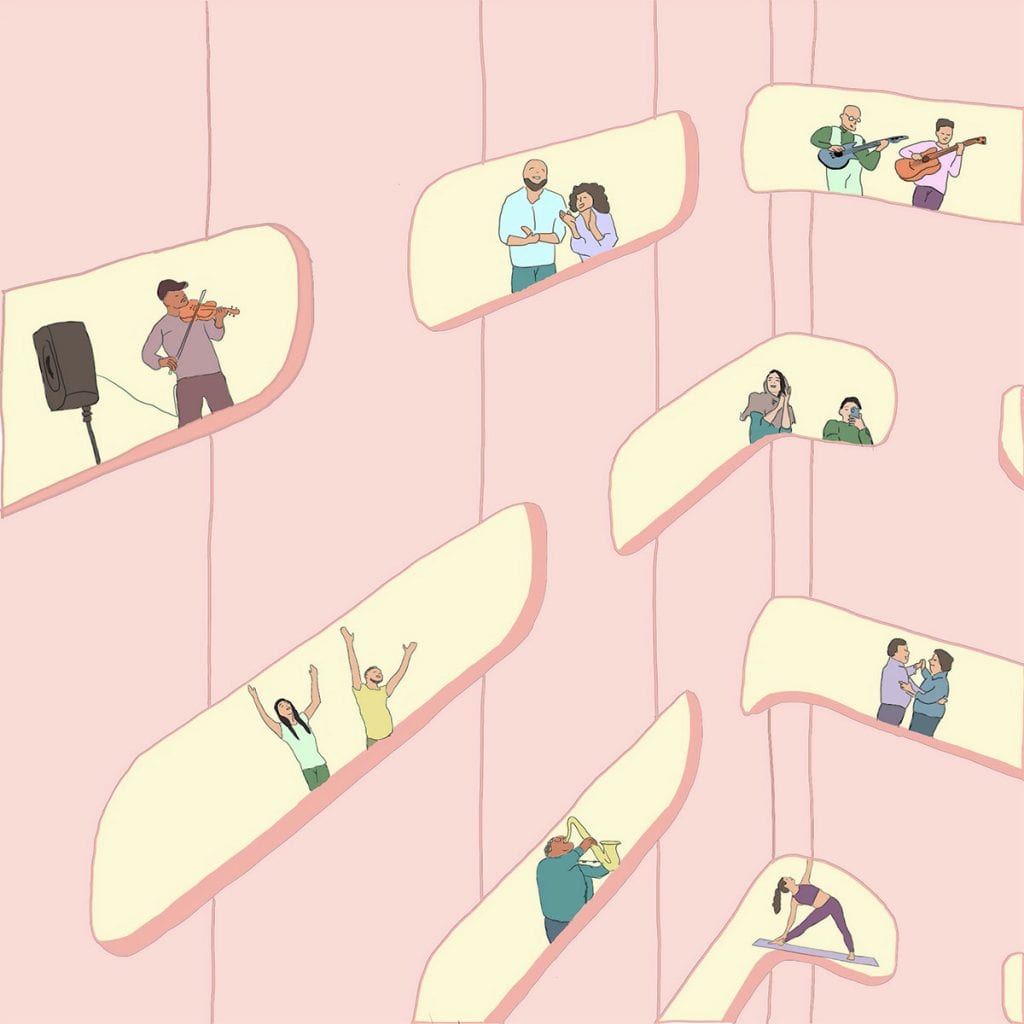Community, Disrupted.

The ongoing Covid-19 pandemic has disrupted our lives—travelling overseas has come to halt, most of us are working remotely from our homes, and large gatherings have become a luxury. Every day, the news shows us how different our world has become. Infections are rising, with some countries reporting record-high case numbers as late as August.
Meanwhile, in Singapore, social gatherings are now limited to small groups and may even take place under the watchful eye of drones. Despite the best efforts of governments and businesses, an increasing number of workers are losing their jobs—an estimated one in four Singaporeans has been retrenched as a result of the pandemic. In fact, the country’s unemployment rate—2.9% in June—is the highest it’s been in a decade.
Worst of all, we read and hear about people who refuse to wear masks or adhere to social distancing rules for their own comfort.
Amid such a tumultuous year, initial responses of fear have mostly turned into feelings of jadedness. Many of us are reluctantly accepting that it will take a long time for the world to return to normalcy.
That doesn’t mean returning to a pre-Covid world. Some of the new practices implemented during the Circuit Breaker period just might stick—think Zoom meetings and celebrations, working from home, and social distancing.
While Singapore has entered into Phase Two of Circuit Breaker and is starting to lift bans like dining in and house visiting, our physical interactions are still very much limited. Even face-to-face gatherings of five people are enough to make us apprehensive!
As we gain more clarity and insights on how we can cope during these times, there is also value in looking beyond the individual and reflecting on Covid-19’s impact on communities in Singapore.
How Covid-19 has impacted communities in Singapore

Beyond Social Services is a charity dedicated to helping children and youths from less privileged backgrounds break away from the poverty cycle. Hooi Boon, a worker from this community, shared that the Circuit Breaker period prompted her team to diverge from their original job scope of community work toward a service-provider role. They focused on three essential services—food distribution, financial assistance, and supporting children who face issues in home-based learning.
This decision deviates from Beyond’s asset-based community development (ABCD) practices. (ABCD focuses on identifying assets in the community and empowering members to make their own decisions.) However, as the team saw that there was urgency and importance in helping the community tide through this difficult period, they decided to temporarily shift the focus of their work to the direct provision of services.
Similarly, Vincent, the curator for A Good Space (AGS), recognised a distinct change in his relationship with the members during the pandemic. Prior to Covid-19, the members of this co-operative for changemakers saw AGS’ role primarily as a venue provider. This role became obsolete when the Circuit Breaker was implemented and all physical gatherings were banned, prompting Vincent to reflect on how AGS can adapt to this new environment.
Thankfully, the transition to using digital spaces, such as by holding virtual events and discussion groups, was smooth for the members. Thereafter, Vincent shifted his efforts to rallying AGS members to collaborate. He brought together people who were advocating for different social issues to share their experiences with one another and learn how other communities have been affected by Covid-19. He also encouraged them to share about their work and identify potential areas for partnership.
Likewise, Michelle, a programme manager for ArtsWok, an organisation that uses arts-based approaches to develop community, shared about the struggle of understanding how community-building looks like in this season where bodies and physical spaces can no longer interact with each other. As artists move into digital spaces, many have ended up questioning their practice.
Michelle says: “A lot of [performance art] is in the embodied experience. And when it is taken away and you are being nudged towards the digitisation of your craft, what does this mean?”
While she and artists grapple with this unprecedented change, Michelle is thankful and encouraged that many freelancers in the art scene are gathering together and supporting each other.
The pandemic has taken an emotional toll on community builders, too
While most community builders in Singapore are now working from home, many have been feeling more exhausted and experiencing burnout. This is likely a result of having to constantly listen to different stories and trying to support individuals and groups who are undergoing tough transitions and pandemic-induced problems.
Abhishek from A Good Space shared that the first few weeks of Circuit Breaker were tumultuous, filled with early mornings and late nights. Mai from CMX Connects SG reflects that community builders are often “absorbers of what’s happening” because they have to be there for their community, like a sounding board. Add to this the fact that community builders often have to wear many hats and serve different roles.
Mai also points out that Covid-19 is close to home and is not an experience detached from the lives of community builders. All these different layers, added to the existing complexity of community building, have caused a mental or emotional strain. She urges community builders to practise self-care and be mindful of working and serving beyond their capacity.
Some community builders also expressed that they have felt helpless and overwhelmed with the seemingly endless amount of work to be done and communities to serve. Cui Fen, from Foodscape Collective, an organisation that aims to build a more inclusive circular food system through outreach, education, and community-building, shared that she struggled with a lack of capacity to meet demands. As a food-related community, Foodscape Collective was receiving many requests to help other communities with food-related issues. It took some time for her to accept that she, as well as the Foodscape Collective, will not be able to solve all the food-related problems in Singapore.
While we acknowledge that we cannot help everyone, Mai says this should not discourage community builders from doing their best to help out. Rather, she encourages them to continue their work within their capacity, while setting boundaries and practising self-care.
Technology as an essential good
While the transition to digital spaces might seem seamless for most people, community builders reflected that access to technology has now become a necessity to community-building, causing the practice to be potentially exclusive. Digitisation leaves out the elderly who might struggle with learning how to use gadgets, while low-income groups might not be able to afford devices to access digital spaces.
Danny, a community-builder from Repair Kopitiam, an organisation that teaches people how to fix damaged appliances, shares that their work has been completely brought to a halt as it is extremely challenging to teach people online. For example, it is nearly impossible to effectively teach someone how to fix an appliance using a webcam.
Timothy, a social worker from Rainbow Centre who works with children with special needs and disabilities, struggled with having to shift his work online. The children he works with usually do not rely on verbal language and require other sensory tools to communicate. Therefore, not being able to interact physically makes it difficult for Timothy and his colleagues to work with their students. In response to these changes, his team has started to build packages to educate their students’ parents and caregivers in becoming co-facilitators during the sessions.
Systems, systems, systems
Looking through a macro lens, many community builders observed the surfacing of gaps in current systems and communities.
For instance, when schools shifted to home-based learning, many students from lower-income families or vulnerable backgrounds did not own a laptop, resulting in them being unable to attend online classes. When this issue surfaced, communities rallied together to provide laptops for these students through their own resources or sought the public’s help to sponsor or donate laptops. These efforts are certainly worth celebrating, but we also ask: “Why are there children with no laptops in the first place?” “Will solely providing students with laptops enable a conducive home-based learning experience? What about households living in small flats with many children?”
Another issue was that many budget schemes aimed at assisting the low-income groups can only be accessed digitally. Folks who were not tech-savvy struggled with accessing schemes and some were not even aware of these policies. In response to this, Abhishek shared that policies are only as effective as their accessibility.
But, we can celebrate too!
While this season does paint a depressing picture, there are pockets of joy to celebrate. The shift to working from home has resulted in a more flexible working schedule for most people, allowing them to spend more time volunteering and serving in different organisations.
Timothy has seen an increase in volunteers in Rainbow Centre, serving as befrienders for people with disabilities. Different organisations serving migrant workers have come together to share resources and insights—a stark difference from struggling in silos previously. Abhishek noted the outpouring of support from companies in Singapore like Grab, Shopee, and Amazon in terms of providing financial and manpower resources. Beyond Social Services also observed the mobilisation of members who stepped up to become community leaders, a huge change from when they used to be more passive and reliant on family service centres or social services agencies.
In general, it also seems that there is mutual understanding that this is a challenging season for everybody. As a result, community leaders have observed that people seem to be kinder and more empathetic in both their work and social circles.
Moving forward
It might be nearly impossible to go back to how things were pre-Covid-19. In fact, Singapore’s Trade and Industry Minister Chan Chun Sing says we must “chart a new path”, as some changes wrought by the pandemic are permanent. Gaps surfaced during the pandemic will not disappear; thus, we need to re-examine how advocacy is conducted and social issues are addressed.
Conversations and engagements need to happen and continue even after the pandemic. Ground-up groups should also be given more recognition and resources to expand their capacity and increase effectiveness in their work. Ideally, ground insights and narratives need to be communicated and translated into policy.
While community builders fear that Singapore’s demanding work culture will hinder them from continuing to volunteer or serve in communities, they still hope that this season has planted a seed in people to keep volunteering in the future.
But for now, let’s focus on making it past this difficult period—slowly, but surely. There is power in communities when we rally and work together. Ganbatte, everyone!…





















